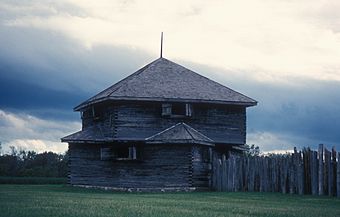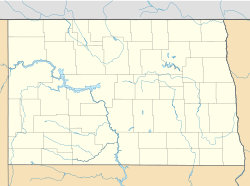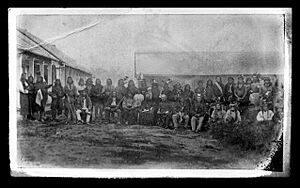Fort Abercrombie facts for kids
Quick facts for kids |
|
|
Fort Abercrombie
|
|

Fort Abercrombie in 2007
|
|
| Location | Abercrombie, North Dakota |
|---|---|
| Built | 1860 |
| Architect | WPA |
| Architectural style | Rustic/Log |
| NRHP reference No. | 08001367 |
| Added to NRHP | January 22, 2009 |
Fort Abercrombie was an important United States Army fort in North Dakota. It was built by the Army in 1858. This fort was the first permanent military base in what is now North Dakota. Because of this, it is known as "The Gateway to the Dakotas."
The fort was first built near the Red River of the North. However, this spot often flooded in the spring. So, the Army moved the fort to higher ground in 1860.
Contents
History of Fort Abercrombie
The new Fort Abercrombie was built in 1860 on higher land. This new location was north of the first fort. It became a very important place for travel and trade. The fort protected the Red River Trails. These trails were used by Red River ox carts for the fur trade. Military supply wagons, stagecoaches, and steamboats also used this area.
The original buildings of the fort were either destroyed or sold. But in 1939–1940, a project called the Works Progress Administration helped rebuild parts of the fort. They rebuilt three blockhouses and the stockade. They also brought the original military guardhouse back to the site.
More recently, some parts of the fort have been updated. A new stockade was built. Today, you can see where old buildings once stood because native grasses grow there. A visitor's center was built in 2007. Now, it is called Fort Abercrombie State Historic Site. It has a modern museum and a pavilion in the town of Abercrombie. The fort itself is a short distance east of the town.
The Dakota War of 1862
Fort Abercrombie played a big role during the Dakota War of 1862. During this time, the Dakota (Sioux) people attacked many settlements. They also attacked Fort Abercrombie. The fort was surrounded for more than six weeks.
At the start of the fighting, Captain John Vander Horck led the soldiers at Fort Abercrombie. Many settlers came to the fort for safety. On August 25, 1862, Captain Van der Horck formed a militia group from these settlers. Captain T. D. Smith was put in charge of this new group.
Attacks on the Fort
In August 1862, the fort faced its first big test. Many people, including important officials, were seeking safety there. The Sioux surrounded Fort Abercrombie for almost six weeks. They attacked the fort several times. The defenders used rifles, shotguns, and two small cannons called howitzers to protect the fort.
The first attack happened on September 3, 1862. It lasted for six hours. Reinforcements arrived, helping to break the attack. After dark, a scout named Pierre Bottineau bravely left the fort. He traveled 80 miles to get more help.
A second attack came three days later. The soldiers were impressed by how organized this attack was. The howitzer cannons helped keep the fort from being taken. After this, the soldiers built stronger defenses using soil and wood.
End of the Siege
The fort was surrounded for a long time. Finally, a large group of 500 militia soldiers arrived. This force helped to end the siege.
After the war, some soldiers and civilians felt that Captain T. D. Smith deserved special thanks. They believed his leadership helped save their lives.
Soldiers at the Fort
Different groups of soldiers were stationed at Fort Abercrombie over the years. For example, a company from the 9th Minnesota Infantry Regiment stayed there for over a year. Later, other groups, including former Confederate prisoners of war who joined the federal service, were also stationed at the fort.
Casualties During the War
Here are some of the people who were killed or wounded during the attacks on Fort Abercrombie:
- Killed:
* Sgt Edward Wright (September 23, 1862) * Corporal James Bennett * Private Joseph Comptois (September 6, 1862) * Ostler Charles W. Soell (September 6, 1862) * Private Augustus Ruchenell
- Wounded:
* Private C. P. Lull (Severely; September 23, 1862) * Private Edwin M. Wright (Severely; September 3, 1862)
1870 Peace Treaty
On August 14, 1870, a very important peace agreement was signed at Fort Abercrombie. Leaders from the Sioux and Chippewa nations signed this treaty. A Catholic priest named Father Genin helped make this happen. This treaty successfully ended conflicts between the two tribes. It is a peace agreement that has lasted to this day.
See also
 In Spanish: Fuerte Abercrombie para niños
In Spanish: Fuerte Abercrombie para niños
 | Frances Mary Albrier |
 | Whitney Young |
 | Muhammad Ali |




